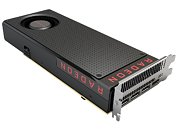Saturday, July 2nd 2016

Official Statement from AMD on the PCI-Express Overcurrent Issue
AMD sent us this statement in response to growing concern among our readers that the Radeon RX 480 graphics card violates PCI-Express power specification, by overdrawing power from its single 6-pin PCIe power connector and the PCI-Express slot. Combined, the total power budged of the card should be 150W, however, it was found to draw well over that power limit.
AMD has had out-of-spec power designs in the past with the Radeon R9 295X2, for example, but that card is targeted at buyers with reasonably good PSUs. The RX 480's target audience could face troubles powering the card. Below is AMD's statement on the matter. The company stated that it's working on a driver update that could cap the power at 150W. It will be interesting to see how that power-limit affects performance.
AMD has had out-of-spec power designs in the past with the Radeon R9 295X2, for example, but that card is targeted at buyers with reasonably good PSUs. The RX 480's target audience could face troubles powering the card. Below is AMD's statement on the matter. The company stated that it's working on a driver update that could cap the power at 150W. It will be interesting to see how that power-limit affects performance.
"As you know, we continuously tune our GPUs in order to maximize their performance within their given power envelopes and the speed of the memory interface, which in this case is an unprecedented 8 Gbps for GDDR5. Recently, we identified select scenarios where the tuning of some RX 480 boards was not optimal. Fortunately, we can adjust the GPU's tuning via software in order to resolve this issue. We are already testing a driver that implements a fix, and we will provide an update to the community on our progress on Tuesday (July 5, 2016)."

358 Comments on Official Statement from AMD on the PCI-Express Overcurrent Issue
I just think it's shitty, regardless of who did it.. Sounds like the power spec is way out.
Kind of a big deal, seeing as they kept screaming how little power it used..
you cant have a good gaming experience if you dont have the GeForce GTX® logo/sticker in your PC afterall :^)
most probably doesnt care about efficiency either, or they are simply too new to remember the HD5xxx vs GTX 4xx series
This doesn't even account the insane number of people who will never update past the driver that came on the DVD
The GTX 960, was tested, and even while overclocked it was working excellent regarding its power delivery (*unlike the RX480).
Also, the advertising for the GTX970 was correct. They didn't advertise ROP count, they didn't advertise cache size. So you don't really have a point there.
P.S. Anyway, just like so many guys already said, i would like to emphasize on this video:
But , hey, with your money you can do what you want.;)
You don't even have RX480 and you're making it like it has already fried your PCIe circuitry...
In the end I feel like the stupid little fool, trying to have a honest conversation with people who will commit suicide before posting anything questionable about Nvidia.
The one long-time poster I've seen with RX480 at [H] has 2 cards and stress tested them for hours without issue in one PC.
( P.S. Of course you are correct. I don't own a RX 480, and the last few years, i'm nowhere near interested fo buy AMD's GPUs. Already explained myself at post #43 of this thread. If you like, take a look at it;) )
Now, lets go back to the Gamers Nexus observed wattage pull when OC'd, 192W from a 150W power supply with MORE THAN HALF of that coming through the PCIe slot. That's a 128% jump over spec. That's like trying to pull 32 amps from a 25 amp wall socket. You could burn your house down if there were no fail-safes. Even a nonOC'd card will pull 86W from the PCIe slot, or 15% more than max. These aren't guidelines, they are absolute limits.
The RX 480 is the ONLY GPU in history to average more than 75W from the PCIe slot at stock clocks. The only way to prevent it is to limit wattage to 150W, really less becasue it pulls more from the PCIe slot than the 6 pin connector, so lets say 145W. That would require a 14.4% under-clock of the card. A card that already is 15% less powerful than a GTX 1060 which will be able to AT LEAST OC another 20%. So, now we're talking about a GTX 1060 that will be around 50% more powerful than a reference RX 480 and 25% more powerful than an OC'd AIB 480 for about $250. Being released at the same time as the AIB cards which will most likely cost $300.
This was a MUST WIN for AMD, but instead it became worst case scenario.